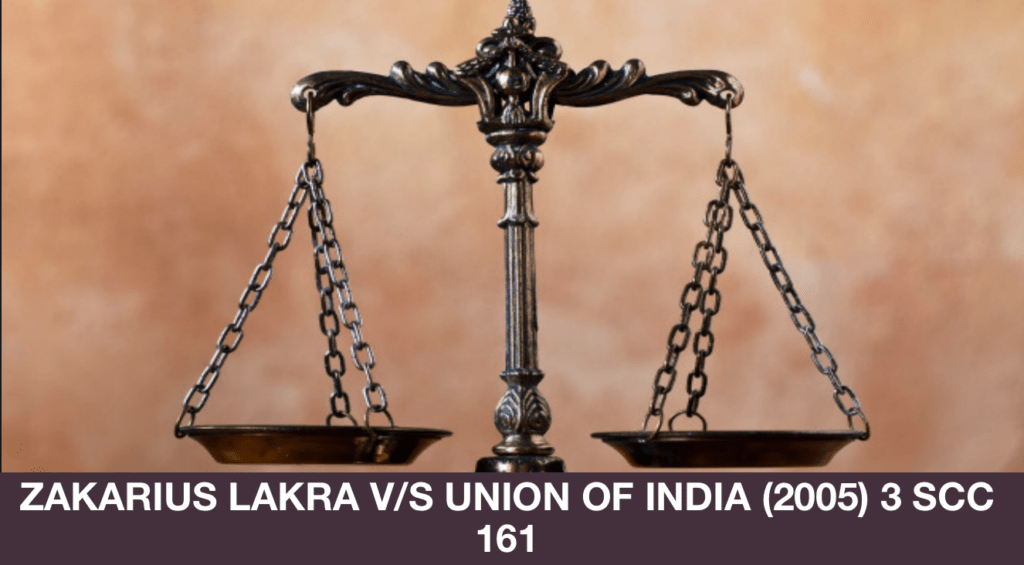
ZAKARIUS LAKRA V/S UNION OF INDIA (2005) 3 SCC 161
| Citation | (2005) 3 SCC 161 |
| Date of Judgment | 16.02.2005 |
| Court | Supreme Court of India |
| Case Type | Criminal Appeal No. 824 of 2002 |
| Appellant | Zakarius Lakra |
| Respondent | Union of India |
| Bench | P V Reddi, A Mathur |
| Referred | CrPC,1973 – Section 313, COI- Article 21, 32 and J.J. Act, 1986(repealed)- Section- 22(1) |
FACTS OF THE CASE
The appellants, in this case, were the parents of a boy who was sentenced to death by the Additional Sessions Judge, Dehradun which was further confirmed by the High Court and further confirmed by this court. The appellant filed a writ petition under Article 32 questioning the legality of the death sentence given by the apex court. The petitioner herein claimed that the boy was a juvenile (D.O.B-04.01.1980) when the offense was committed i.e. 15.11.1994 and produced documents to prove his claims. The petitioner produced two documents issued by the school authority of West Bengal dated 28.04.2001 and 02.08.2002 but these were not brought to the notice during the hearing of the appeal.
ISSUES
Whether the death sentence imposed on the appellant can be quashed on the ground that he was a juvenile on the date of the commission of the offense?
ARGUMENTS
The Petitioner argued that the boy(accused) was a juvenile on the date of commission of the crime. Accused school documents show that he was a juvenile and his date of birth was 04.01.1980 and the incident happened on 15.11.1994. The school certificate produced dated 28.04.2001 and 02.08.2002 before the court at the time of hearing of appeal but it was not taken into consideration. The present petition seeks to modify the death sentence to life imprisonment.
Learned counsel has referred the judgment of this court in Raj Singh v. State of Haryana and Gopinath Ghosh v. State of West Bengal. The court gave appropriate relief to the offender being the juvenile. Learned counsel also drew the attention of the court in Ramdeo Chauhan v. State of Assam in which the court took a liberal approach and opted to consider that even if he is not proven to be a juvenile, can be given the benefit of age on the ground of his allegedly being on the borders of the age contemplated under the Act for the purposes of awarding him the alternative sentence of imprisonment for life. Judges also decided to abide by the laws made by the majority of judges in the Bachan Singh case.
For the aforesaid reasons, the court allowed to review the petition and alter the death sentence to life imprisonment.
JUDGEMENT
In the present matter documents submitted by the learned counsel that the accused was a juvenile on the date of the crime. It was not known whether it formed part of the relevant record furnished by the Registry to the amicus curiae who pleaded the case of the appellant. It is on the basis of this material that the learned counsel for the petitioners submits that the imposition of the death sentence is not proper.
The court made clear that the learned counsel seeks to modify the death sentence to life imprisonment and documents which were produced can be verified by directing an enquiry by the named authority or Court.
In the decision, the court mentioned the judgment of Rupa Ashok Hura v. Ashok Hura that the current petition is not maintainable under Article 32 but the court allowed to convert the present petition into a curative petition after some amendment and following procedure.
Before closing, the Court regarding the age mentioned 20 years as his statement was recorded on 07.03.2001 under Section 313 Cr.P.C. The trial court viewed the evidence produced before him that the accused had a passbook and cheque on 09.03.1994. The High Court noted that the accused admittedly opened a bank account in the Punjab Nation Bank on 09.03.1994. High Court observed that a bank account be opened unless he was major.
The court concluded that the appeal before this court was decided without looking at the school certificate.
The court considered the appropriate contentions raised and citation given so that the learned counsel may receive due consideration in the curative petition taken for consideration by a larger bench.
The court dismissed the present appeal and allowed to file a curative petition.
REFERENCES
Zakarius Lakra And Others v. Union Of India And Another, Supreme Court Of India, Judgment, Law, casemine.com, https://www.casemine.com (2022), https://www.casemine.com/judgement/in/5609ae1de4b0149711413016 (last visited Sep 2, 2023).
MANU/SC/0875/1999
MANU/SC/0101/1983
MANU/SC/0297/2001
(1980) 2 SCC 684
Written by Anirudh Modi an intern under legal vidhiya.




0 Comments